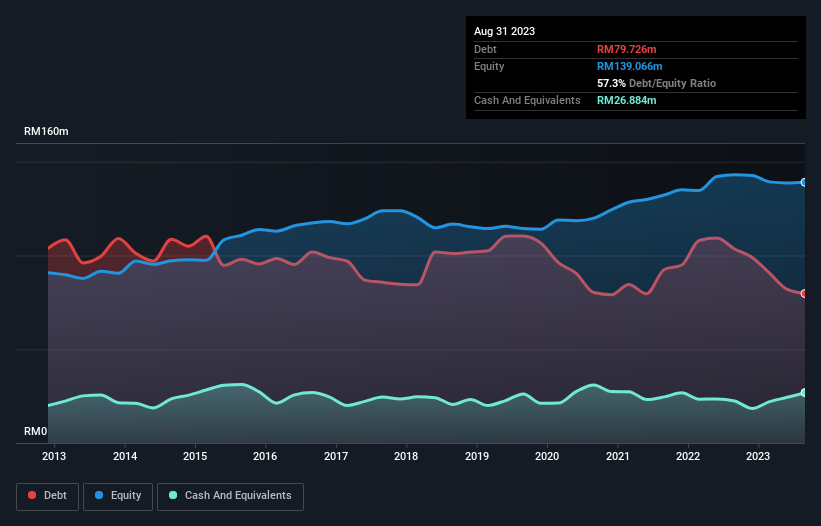- Malaysia
- /
- Consumer Durables
- /
- KLSE:PENSONI
Does Pensonic Holdings Berhad (KLSE:PENSONI) Have A Healthy Balance Sheet?

Some say volatility, rather than debt, is the best way to think about risk as an investor, but Warren Buffett famously said that 'Volatility is far from synonymous with risk.' It's only natural to consider a company's balance sheet when you examine how risky it is, since debt is often involved when a business collapses. We note that Pensonic Holdings Berhad (KLSE:PENSONI) does have debt on its balance sheet. But the more important question is: how much risk is that debt creating?
When Is Debt A Problem?
Debt assists a business until the business has trouble paying it off, either with new capital or with free cash flow. If things get really bad, the lenders can take control of the business. However, a more frequent (but still costly) occurrence is where a company must issue shares at bargain-basement prices, permanently diluting shareholders, just to shore up its balance sheet. Of course, debt can be an important tool in businesses, particularly capital heavy businesses. When we think about a company's use of debt, we first look at cash and debt together.
Check out our latest analysis for Pensonic Holdings Berhad
What Is Pensonic Holdings Berhad's Net Debt?
You can click the graphic below for the historical numbers, but it shows that Pensonic Holdings Berhad had RM79.7m of debt in August 2023, down from RM103.5m, one year before. However, because it has a cash reserve of RM26.9m, its net debt is less, at about RM52.8m.

How Strong Is Pensonic Holdings Berhad's Balance Sheet?
Zooming in on the latest balance sheet data, we can see that Pensonic Holdings Berhad had liabilities of RM101.3m due within 12 months and liabilities of RM24.3m due beyond that. Offsetting these obligations, it had cash of RM26.9m as well as receivables valued at RM47.2m due within 12 months. So it has liabilities totalling RM51.4m more than its cash and near-term receivables, combined.
Pensonic Holdings Berhad has a market capitalization of RM96.8m, so it could very likely raise cash to ameliorate its balance sheet, if the need arose. But we definitely want to keep our eyes open to indications that its debt is bringing too much risk.
We use two main ratios to inform us about debt levels relative to earnings. The first is net debt divided by earnings before interest, tax, depreciation, and amortization (EBITDA), while the second is how many times its earnings before interest and tax (EBIT) covers its interest expense (or its interest cover, for short). Thus we consider debt relative to earnings both with and without depreciation and amortization expenses.
Weak interest cover of 0.61 times and a disturbingly high net debt to EBITDA ratio of 7.7 hit our confidence in Pensonic Holdings Berhad like a one-two punch to the gut. This means we'd consider it to have a heavy debt load. Even worse, Pensonic Holdings Berhad saw its EBIT tank 84% over the last 12 months. If earnings continue to follow that trajectory, paying off that debt load will be harder than convincing us to run a marathon in the rain. There's no doubt that we learn most about debt from the balance sheet. But you can't view debt in total isolation; since Pensonic Holdings Berhad will need earnings to service that debt. So if you're keen to discover more about its earnings, it might be worth checking out this graph of its long term earnings trend.
Finally, a company can only pay off debt with cold hard cash, not accounting profits. So we clearly need to look at whether that EBIT is leading to corresponding free cash flow. Over the last three years, Pensonic Holdings Berhad reported free cash flow worth 4.5% of its EBIT, which is really quite low. For us, cash conversion that low sparks a little paranoia about is ability to extinguish debt.
Our View
On the face of it, Pensonic Holdings Berhad's interest cover left us tentative about the stock, and its EBIT growth rate was no more enticing than the one empty restaurant on the busiest night of the year. Having said that, its ability to handle its total liabilities isn't such a worry. We're quite clear that we consider Pensonic Holdings Berhad to be really rather risky, as a result of its balance sheet health. For this reason we're pretty cautious about the stock, and we think shareholders should keep a close eye on its liquidity. When analysing debt levels, the balance sheet is the obvious place to start. But ultimately, every company can contain risks that exist outside of the balance sheet. To that end, you should be aware of the 2 warning signs we've spotted with Pensonic Holdings Berhad .
If, after all that, you're more interested in a fast growing company with a rock-solid balance sheet, then check out our list of net cash growth stocks without delay.
New: Manage All Your Stock Portfolios in One Place
We've created the ultimate portfolio companion for stock investors, and it's free.
• Connect an unlimited number of Portfolios and see your total in one currency
• Be alerted to new Warning Signs or Risks via email or mobile
• Track the Fair Value of your stocks
Have feedback on this article? Concerned about the content? Get in touch with us directly. Alternatively, email editorial-team (at) simplywallst.com.
This article by Simply Wall St is general in nature. We provide commentary based on historical data and analyst forecasts only using an unbiased methodology and our articles are not intended to be financial advice. It does not constitute a recommendation to buy or sell any stock, and does not take account of your objectives, or your financial situation. We aim to bring you long-term focused analysis driven by fundamental data. Note that our analysis may not factor in the latest price-sensitive company announcements or qualitative material. Simply Wall St has no position in any stocks mentioned.
About KLSE:PENSONI
Pensonic Holdings Berhad
An investment holding company, manufactures, assembles, and sells electrical and electronic appliances in Malaysia, other Asian countries, the Middle East, and internationally.
Slight with mediocre balance sheet.
Market Insights
Community Narratives




